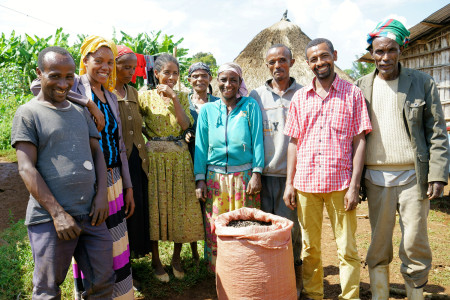Legend has it that coffee was first discovered in Ethiopia over a thousand years ago by a goatherd named Kaldi, whose goats drew him to the red berries. Whether this story is true or not, Ethiopia has maintained its strong links to coffee down the centuries – even the name ‘coffee’ derives from ‘Kaffa’, the Ethiopian province where coffee first thrived.

Despite this long history, making a living from farming coffee can be a struggle. Many farmers harvesting the wild coffee which grows in Ethiopia’s forests make less than $1 a day because they lack the tools, training and bargaining power to build profitable businesses. These hard-working people are living in poverty for reasons that are preventable.
Today, green coffee is Ethiopia’s largest export and coffee is the main source of income in forest regions like Oromia, in central Ethiopia. Local beans end up as far afield as the US, Europe and Japan. But while the volume of Ethiopia’s coffee exports is increasing, prices are falling, putting more pressure on the already struggling 15 million people working in the country’s coffee industry.
Ethiopia’s diverse varieties, flavours and natural forest-friendly production methods should provide wild coffee producers with an advantage in the international market. Half of the country’s annual coffee production comes from wild coffee but although it is an organic, high-value product, most forest communities hardly benefit from its sale.
For coffee producers to get a good price for their wild coffee, their beans needs to be branded and licensed to certify they meet quality standards. However, local subsistence farmers have struggled to reach the standards required because they lack training in effective coffee production practices, business and marketing skills. As a result they have no option but to sell their coffee locally for a much lower price than they would fetch if their processes were upgraded.
International development charity Farm Africa is setting up farming cooperatives which provide wild coffee farmers with training and assistance to access markets so they can to secure better prices for their improved wild coffee.
Abate is a smallholder coffee farmer and chairman of the Abdi Gudina Farmers Cooperative, which is one of numerous farmers groups benefiting from support in Oromia.
Abate explains, “The role of our cooperative is to train the community and create awareness on how to maintain coffee quality through visits, training and by focusing on our resources.”
One of the most effective ways to sustainably increase the incomes of wild coffee farmers is to help them improve how they process their beans on their farms. Traditionally, coffee is collected, dried and stored in clean sacks before being processed and sent to market. But currently, post-harvest practices amongst many farmers in Oromia are inadequate as they cannot afford to buy simple jute sacks to store their coffee, and don’t have the capital and specialist knowledge needed to process the beans.
Coffee is hygroscopic, meaning it has the ability to attract and hold water molecules from the surrounding environment, which can drastically change its taste. Farm Africa is assisting Abate and his fellow farmers to increase quality through the introduction of new methods of harvesting, handling and transportation. This includes only picking ripe coffee and improving its washing, drying, packing, storing and transportation. Keeping coffee beans clean and dry throughout all production stages is crucial as improved quality can increase a farmer’s household income by about 60%.

Farm Africa – Abate picking coffee beans
Abate says, “I learnt coffee from my father but the income we get from it alone isn’t enough for my family. Since training, the way we harvest coffee has totally changed. We no longer collect cherries from the ground, we separate healthy and diseased trees, we pick selectively and we dry them on raised beds.”
After beans have been dried and processed, they need to be graded. A high-quality grade means that coffee can be exported to countries like the UK and USA, whereas lower grades are only traded locally. For farming cooperatives to go directly to the Ethiopia Commodity Exchange (ECX) to get their beans graded for international export, they need a licence. Farm Africa is helping cooperatives to obtain these licences, which means that farmers will be able to sell their beans for a higher price on the international market.
“Had it not been for the cooperative, we wouldn’t be able to share knowledge in this way,” says Abate. “We have come together and join our hands to make a change to our lives. As individuals we can’t do this, but together we have a louder voice.
“Potential markets are usually located far away. If we approach these at an individual level, we cannot sell. If we do this in bulk, we work together to transport the coffee and have an impact. Unity is strength and we can do more as a group.”










